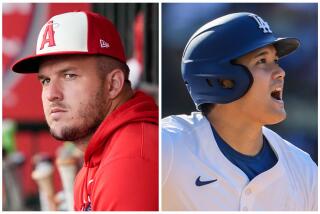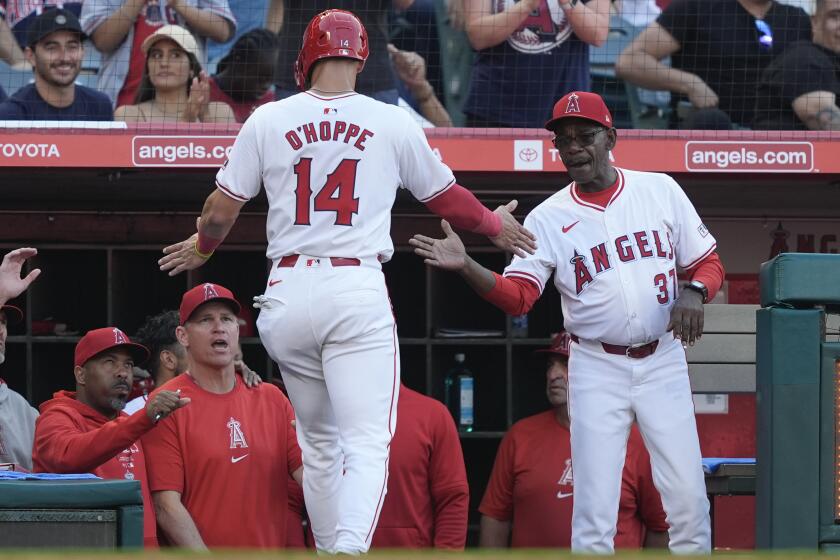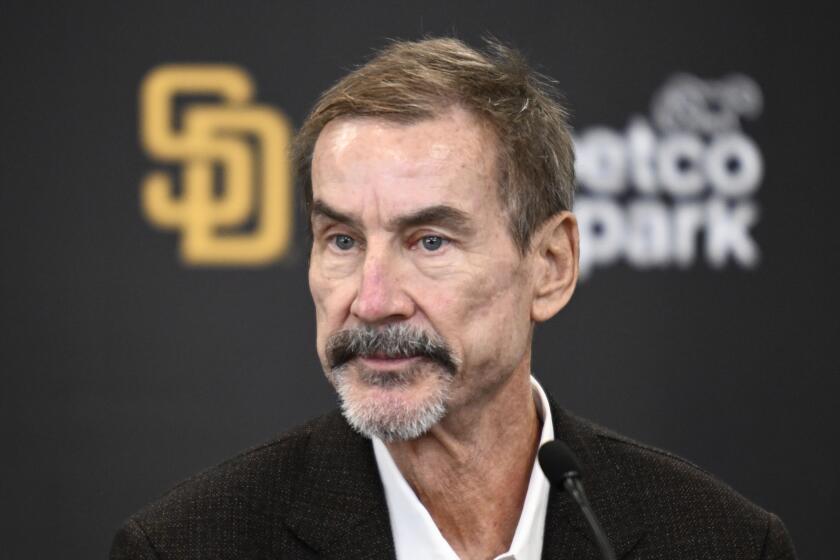Playing in the State of Air Alert : Quarterback Parker Stands Up to Asthma . . . and Secondaries
The quarters where Cal State Northridge quarterback Chris Parker lives are not exactly spacious. He lives in one of those dormitory rooms where you have to step outside to change your mind.
Looking somewhat out of place are four pillows stacked on Parker’s bed. Certainly, these offer nothing in the way of relief for an already cramped situation. But for Parker, the pillows are a way of life--a delicate cushion which separates his ability to breathe or not breathe.
The Northridge quarterback suffers from severe asthma. The chronic breathing disorder demands as much attention from Parker as a safety blitz.
Every Saturday during the fall, right before game time, Parker straps on all of the traditional football gear. Like his CSUN teammates, the quarterback checks his shoulder pads, adjusts his hip pads and buckles his chin strap.
But Parker’s uniform is not complete until he tucks one last piece of equipment in his sock--equipment foreign to most football players.
This is where Parker keeps a plastic inhaler, a device that helps him breath during asthma attacks. Over the years, the inhaler has not been needed during games. And only a few times during practice has he had to call upon it for help.
“I just try to blow it off,” Parker said of his asthma, “and not let it stop me.”
Parker, who took over as the Northridge starting quarterback this season, could not be stopped last week. He passed for 295 yards and four touchdowns in CSUN’s 45-13 victory over St. Mary’s. The four touchdown passes equaled the Matadors’ single-game record in a Western Football Conference game. For his efforts, the 6-1, 180-pound junior was named WFC player of the week.
Twice each day Parker, 20, must take antihistamines. But inconveniences like that aren’t going to stop Parker.
He has had to deal with the realities of asthma since he was six months old. Along with that have been other physical problems. An allergy condition has left him with no sense of smell. He was once near death after an allergic reaction following an injection.
Parker was 14 when he suffered the severe reaction to routine shots. Minutes after leaving the hospital, Parker suddenly began gasping for breath and asked his mother, “Am I going to die?” Parker was driven to a fire station for oxygen before being rushed back to the hospital.
Despite the close call, Parker never really considered asthma a hindrance. He started playing football when he was eight and has played ever since. At first, his mother was concerned.
“I had read in Ann Landers that if your child had asthma, the one thing he should never do is play football,” she said. “But I knew it had to be up to Chris. I couldn’t hold him back.”
Doctors didn’t hold him back either.
Dr. Russell B. Shields of Canoga Park, who treats many asthmatic patients, said that although strenuous activity can cause severe bronchial spasms in asthmatics, it doesn’t mean they can’t participate in sports.
“They just pay a higher price than other athletes,” Shields said.
But it wasn’t the asthma that cost Parker playing time in his first two years with the sport.
“A lot of the coaches in the (Junior All-American) league had kids of their own on the teams back then, and Chris didn’t get to play much even though he was good,” Ted Parker, Chris’s father said. “But even though Chris was discouraged, I don’t think he ever thought about quitting.”
Rather than quit, Parker compensated.
When it was his job to mow the lawn and his allergies made him wheezy and red-eyed, Parker chose to wear a dust mask rather than pawn off the chore.
His father recalls when Chris, then a junior at San Bernardino’s Aquinas High, played an entire game with a broken thumb. The coach moved him to defensive back when his thumb became too swollen to play quarterback, and minutes later Chris returned an interception for the winning touchdown.
Parker, one of eight Parker children, was Aquinas’ most valuable player, All-Southern Section and All-De Anza League following his senior season in 1983.
He might also have qualified as most versatile.
After high school, Parker played defensive back for Saddleback College in Mission Viejo. But when he didn’t get the playing time he felt he deserved, he went back home to play for San Bernardino Valley College. He figured he’d still be a defensive back, but the team needed a quarterback. And Parker needed a job.
His season-long performance as the starting quarterback earned him an invitation to play for CSUN this fall. But Northridge football Coach Tom Keele knew that if Parker never saw a play as quarterback he would still be valuable as the team’s punter.
“When I was recruited to play quarterback for CSUN I just figured I’d be starting,” Parker said. “Then when I reported for spring practice and found out I was fourth string, I was discouraged, but I knew if I was ever going to play in a game I’d have to work hard.”
Between weekly appointments for allergy shots, he spent much of the remainder of his time working hard enough to change his rank.
In addition to daily football practice, he spent eight hours a week lifting weights. He gave up anything that might have stood in the way of becoming CSUN’s No. 1 quarterback.
“Chris is the kind of guy you might ask, ‘Hey, you want to go get a beer?’ and Chris would say, ‘No, we have a game tomorrow,’ ” Keele said. “You might say he’s kind of a throwback to the old days of ball players who were here to get a good education and play hard football.”
The work paid off.
He was second string when the team played its first of two scrimmages this season. It was then that former starting quarterback Danny Fernandez was injured.
“I knew I had a chance to start, so I decided to fight and never quit until I got it,” Parker said.
When the Matadors’ offense lined up against Nevada Reno in its season opener, Parker was leading it.
CSUN was beaten by Reno, 56--12, but Parker was one of the few bright spots in the otherwise dreary game. He completed 21 of 36 passes for 210 yards and carried 12 times for 46 yards. And when the offense stalled, as it did often against Division I-AA powerhouse Reno, Parker responded with eight booming punts for 345 yards.
“He’s an amazing punter,” Fernandez said. “I’ve seen him kick like I haven’t seen anyone kick, even in the pros.”
And Fernandez has seen some of the best. Bryan Wagner, released in the next-to-last cut by the Dallas Cowboys this summer, kicked for Northridge last year and was the best punter in the school’s history.
Parker knows that it might be his punting that gets his foot in the door with a professional team. But for now he’s concentrating on holding down the starting quarterback job.
Several years ago, his mother gave him the book “Psycho-Cybernetics.” She told him to read it and learn how to s ee himself winning .
“Before every game, I listen to the Scorpions (a rock group) and picture myself pulling back and looking for the open receiver, then throwing a perfect pass,” he said.
The Matadors spent 10 hours aboard busses to Reno and St. Mary’s. A number of players talked about the game, some read. Parker was plugged into his music and the fantasia of playing the perfect game.
The positive thinking has helped him on and off the field, his mother, Jane, said.
“When he was yonger he used to have to do breathing exercises, but now he’s never healthier than during football season,” she said. “The doctors always said he would outgrow the asthma, but he never has. It’s something he’s learned to live with.”
Parker never has had an attack during a game. But a few years ago he came home one night and could hardly breathe.
“You could hear him breathing all over the house. It’s horrible when he gets an attack,” his mother said. “His chest heaves something awful. . . .it scares you to death.”
Keele wasn’t aware of Parker’s asthma when he recruited him. “I saw the inhaler in his sock and asked him what it was. He told me he had asthma, but that it was no big deal.”
Keele said that Parker didn’t talk about the asthma because he didn’t want people to feel sorry for him.
“If I’m out there playing my hardest, and my asthma starts to bother me, I figure it’s a motivation to the other players if I keep going,” Parker said.
“There are a lot of times when it would be easier to try and get out of running. I could tell the coach that my asthma is bad, but I tell myself, ‘No, way.’ I wouldn’t use that as an excuse.”
“He’s mentally tough and he doesn’t let it stop him from doing anything. It’s really quite admirable,” Keele said. “I haven’t found one flaw in his character.”
Parker’s roomate, Peter Howell, can’t find one either. He said that all attention that came with being named the team’s starting quarterback and the WFC Player of the Week hasn’t changed him.
“He’s so modest it’s disgusting,” Howell said. “Most athletes have an air of cockiness about them, kind of a Joe Namath strut, but not Chris. He just has that quiet confidence.”
Parker also has one fear: professional teams might ignore him.
“I’ll just keep going, trying harder and harder until someone finally says, ‘Hey, this is your limit.’
“Right now everything’s going my way. I can’t let it slip away,” Parker said. “I hope Danny (Fernandez) keeps pushing. But if he ever gets better than me, I’ll be right back the next day fighting even harder to be number one.”
His father can vouch for that.
“He’ll overcome any obstacle that is put in front of him,” Ted Parker said. “He always has.”
More to Read
Go beyond the scoreboard
Get the latest on L.A.'s teams in the daily Sports Report newsletter.
You may occasionally receive promotional content from the Los Angeles Times.










